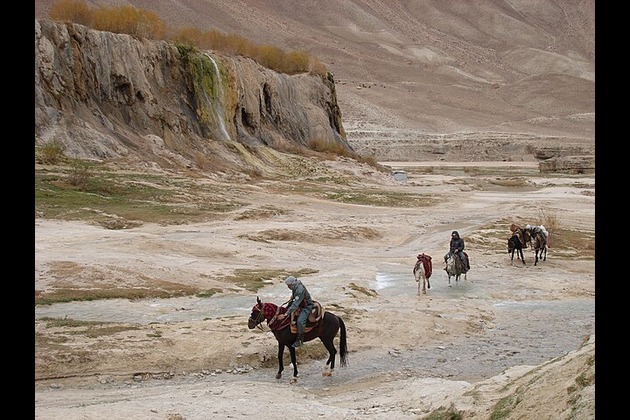Climate change has doubled the world's heatwaves: how Africa is affected
The Conversation
02 Jul 2025, 15:08 GMT+10

A global review of extreme heat has found that between May 2024 and May 2025, nearly half the world's people (49% or 4 billion) suffered through an extra 30 days of temperatures that were hotter than those experienced 90% of the time between 1991 and 2020.
Scientists from World Weather Attribution, the Red Cross Red Crescent Climate Centre, and Climate Central found that climate change had also doubled the number of heatwaves in the world. The research also identified 67 extreme heat events that were influenced by climate change.
The Conversation Africa spoke to climate scientist Joyce Kimutai, one of the authors of the report.
Climate change modifies extreme weather events. In other words, it increases the intensity and likelihood of heatwaves and other extreme weather events. It doesn't cause them; extreme weather events have always happened. But it does make heatwaves much worse and more harmful.
Many people still don't appreciate the danger of heatwaves. We call them "silent killers" because they often cause serious harm without the dramatic visuals of storms or floods. Heatwaves can lead to dehydration, heatstroke, and even death - especially among vulnerable groups like the elderly, children, and those with pre-existing health conditions.
For example, our study focused on a heatwave that saw temperatures rise above 45C in the Sahel (the semiarid region of western and north-central Africa). During this heatwave, Mali recorded temperatures of close to 50C.
We found that this heatwave was 1.5C hotter and ten times more likely to occur due to climate change. To some people, 1.5C might not sound like much, but it really can be the difference between life and death for vulnerable people.
We used attribution science methodology and climate modelling to calculate how much heat climate change has added to an extreme temperature event. In other words, we used a system we invented, known as the Climate Shift Index system, to calculate the number of extreme heat days that would have occurred if humans had never caused climate change. We then compared that to the number of extreme heat days actually happening.
This allowed us to count how many extreme heat days were added by climate change in the past year. It also allows us to predict how heat waves will grow more frequent and intense unless greenhouse emissions from major polluting companies who burn fossil fuels are cut drastically.
To see how climate change affected temperatures over the past year, we first figured out what counted as unusually hot. We based this on the temperatures of the hottest 10% of days from 1991 to 2020. Then we counted how many days between 1 May 2024 and 1 May 2025 were hotter than that level. Finally, we estimated how many of those days were caused by climate change.
Several African countries experienced more than 90 days that were hotter than 90% of the days between 1991 and 2020. These were Burundi, Comoros, Congo, Equatorial Guinea, Gabon, Ghana, Liberia, Mayotte, Rwanda and Sao Tome and Principe. In other words, these countries all experienced at least three months (some, more than four months) of temperatures that were extremely hot.
African countries also experienced 14 of the 67 heat extreme events in the world. An extreme heat event is one that causes major damage to people and property, such as destroying harvests or causing buildings to crack. These heat events hit 42 of Africa's 54 countries.
Read more: Why we need to talk about older people and climate change in Africa
In Africa, the most strongly climate-influenced heatwave took place between 14 and 30 December 2024. We found that climate change made this event at least 15 times more likely to happen. The countries that were particularly affected were in west and central Africa.
Another heatwave took place in February 2025 in South Sudan. Schools had to be shut for two weeks because children were collapsing from heatstroke. The whole population was told to stay out of the sun and hydrate. This was a problem because many houses in South Sudan are built with iron roofs, and lack airconditioning, electric fans and electricity. Not all have clean water.
Southern African countries experienced four extreme heat events, including two five-day heatwaves, in 2024. These were up to nine times more likely caused by climate change. Northern African countries also suffered several serious heatwaves.
Read more: Addis Ababa faces growing climate change risks like heat, drought and floods, study warns
This analysis underscores the serious impact of rising temperatures in Africa. With every small increase in warming, more people across the continent will face extreme heat that threatens their health and well-being.
Clearly, climate change fuelled heat is already making life much more difficult in Africa. As long as the climate warms, more dangerous heat will hit Africa. Adaptation measures alone will become insufficient to protect communities from the escalating risks.
Funds need to be made available immediately for African countries to adapt to extreme heat events. These should be directed to the countries that are worst affected. To prevent extreme heat events from getting much worse in future, the only solution is for the world to stop using planet-heating fossil fuels as soon as possible.
 Share
Share
 Tweet
Tweet
 Share
Share
 Flip
Flip
 Email
Email
Watch latest videos
Subscribe and Follow
Get a daily dose of Africa Leader news through our daily email, its complimentary and keeps you fully up to date with world and business news as well.
News RELEASES
Publish news of your business, community or sports group, personnel appointments, major event and more by submitting a news release to Africa Leader.
More InformationInternational
SectionNew French law targets smoking near schools, public spaces
PARIS, France: France is taking stronger steps to reduce smoking. A new health rule announced on Saturday will soon ban smoking in...
Trump hints at DOGE investigation of Musk subsidies
WASHINGTON, DC - U.S. President Donald Trump on Tuesday claimed Elon Musk's success has been built on government subsidies. Without...
Native leaders, activists oppose detention site on Florida wetlands
EVERGLADES, Florida: Over the weekend, a diverse coalition of environmental activists, Native American leaders, and residents gathered...
Beijing crowds cheer AI-powered robots over real soccer players
BEIJING, China: China's national soccer team may struggle to stir excitement, but its humanoid robots are drawing cheers — and not...
COVID-19 source still unknown, says WHO panel
]LONDON, U.K.: A World Health Organization (WHO) expert group investigating the origins of the COVID-19 pandemic released its final...
Fox faces $787 million lawsuit from Newsom over Trump phone call
DOVER, Delaware: California Governor Gavin Newsom has taken legal aim at Fox News, accusing the network of deliberately distorting...
Business
SectionTaliban seeks tourism revival despite safety, rights concerns
KABUL, Afghanistan: Afghanistan, long associated with war and instability, is quietly trying to rebrand itself as a destination for...
Nvidia execs sell $1 billion in stock as AI boom drives record prices
SANTA CLARA, California: Executives at Nvidia have quietly been cashing in on the AI frenzy. According to a report by the Financial...
Tech stocks slide, industrials surge on Wall Street
NEW YORK, New York - Global stock indices closed with divergent performances on Tuesday, as investors weighed corporate earnings, central...
Canada-US trade talks resume after Carney rescinds tech tax
TORONTO, Canada: Canadian Prime Minister Mark Carney announced late on June 29 that trade negotiations with the U.S. have recommenced...
Lululemon accuses Costco of selling knockoff apparel
Vancouver, Canada: A high-stakes legal showdown is brewing in the world of athleisure. Lululemon, the Canadian brand known for its...
Shell rejects claim of early merger talks with BP
LONDON, U.K.: British oil giant Shell has denied reports that it is in talks to acquire rival oil company BP. The Wall Street Journal...













